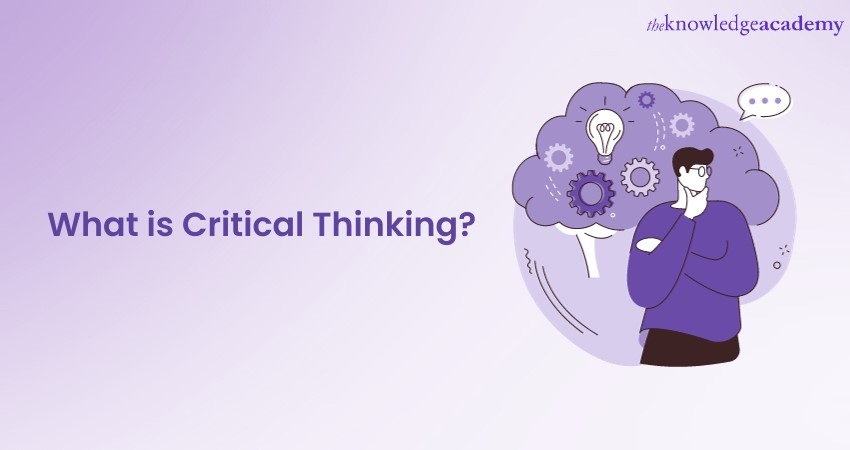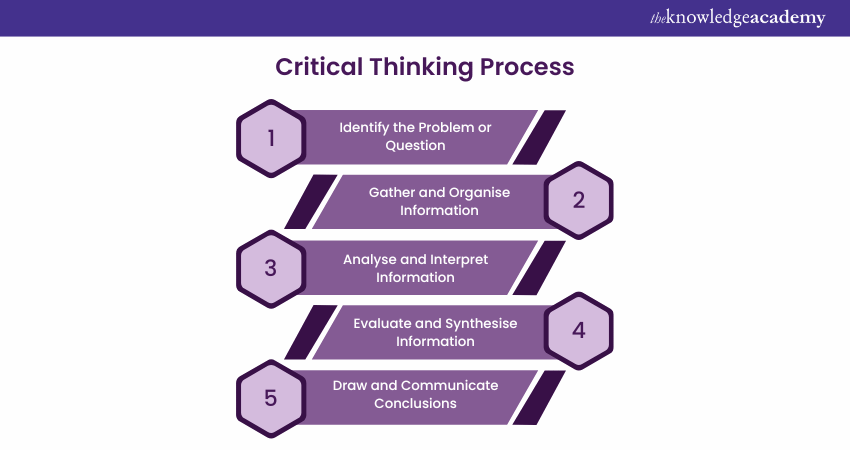We may not have the course you’re looking for. If you enquire or give us a call on 01344203999 and speak to our training experts, we may still be able to help with your training requirements.
We ensure quality, budget-alignment, and timely delivery by our expert instructors.

If you have ever asked, or thought to yourself about the ‘what’ happening in the world, have you ever gone further and followed it up with the ‘why’? That is where Critical Thinking starts working its magic. But What is Critical Thinking, in essence? It is the way of making decisions based on the analysis of data and information, distinguishing between facts and productive interpretations and searching for the hidden meaning.
In such a dynamic paradigm of work, learning and relationships, What is Critical Thinking concept shines like a beacon of navigation. It allows you to reason on your own, work logically and tactfully, and also to be original in problem solving situations. Looking for a site which can challenge you and make you rethink the way you approach things? Let’s dive in!
Table of Contents
1) What is Critical Thinking?
2) 8 Key Critical Thinking Skills
3) Understanding the Critical Thinking Process
4) Benefits of Using Critical Thinking
5) Examples of Critical Thinking
6) Conclusion
What is Critical Thinking?
You might hear Critical Thinking defined as the evaluation of information in logical patterns and making reasonable decisions. Critical Thinking goes beyond knowing the facts and checking limited conventional ideas and scenarios while using a more careful way of problem-solving. This skill enables people to consider the reliability of information, recognise prejudice and consider such evidence practically.
Basically, critical thinking is about promoting effective, accurate and imaginative ways of thinking. That way, individuals can understand how to get through the realities of life, figure out solutions to many things, and convince many people of various issues. The use of Critical Thinking is an effective method of reaching a rational decision in everyday life, being a student, or at work.
8 Key Critical Thinking Skills
Like most soft skills, Critical Thinking is not something you can learn by memorising facts or rules. Rather, it is a skill that involves a variety of interpersonal and analytical skills. Some of the essential skills for Critical Thinking are:

1) Observation: The ability to notice and gather relevant information from various sources, such as data, facts, observations, and experiences.
2) Analysis: The ability to break down complex data into simpler parts, identify patterns and relationships, and evaluate the quality and validity of the information.
3) Interpretation: The ability to understand and explain the meaning and significance of information and to draw logical and reasonable conclusions from it.
4) Reflection: The ability to examine and question your own thinking process, assumptions, and biases and to seek feedback and improvement.
5) Evaluation: The ability to compare and contrast different viewpoints, arguments, and evidence and to assess their strengths and weaknesses.
6) Inference: The ability to make logical and creative connections between different pieces of information and to generate ideas and solutions based on the information.
7) Explanation: The ability to communicate and justify your thinking process, conclusions, and recommendations clearly and effectively to others.
8) Problem solving: Problem Solving is the ability to apply Critical Thinking skills to identify, define, and solve problems in various contexts and situations.
Learn how to turn challenges into opportunities with our Problem Solving Training – Sign up today!
Understanding the Critical Thinking Process
The Critical Thinking process is not a linear or rigid sequence of steps but a flexible and dynamic way of thinking that can be adapted to different situations and purposes. Let’s explore the Critical Thinking process:

1) Identify the Problem or Question: What is the issue or topic that you want to think critically about? What is the purpose or goal of your thinking? What are the criteria or standards that you will use to evaluate the information and arguments?
2) Gather and Organise Information: What are the sources of information that are relevant and reliable for your problem or question? How will you collect and organise the information in a systematic and logical way?
3) Analyse and Interpret Information: What are the main ideas, concepts, and arguments that are presented in the information? How do they relate to each other and to your problem or question? What are the assumptions, biases, and limitations of the information and arguments? How do you interpret and understand the meaning and significance of the information and arguments?
4) Evaluate and Synthesise Information: How do you compare and contrast different viewpoints, arguments, and evidence? How do you assess their strengths and weaknesses? How do you integrate and synthesise the information and arguments to form a coherent and consistent conclusion?
5) Draw and Communicate Conclusions: What are the conclusions or solutions that you have reached based on the information and arguments? How do they address your problem or question? How do they meet the criteria or standards that you have set? How do you communicate and justify your conclusions or solutions clearly and effectively to others?
Fuel innovation with our Creative and Analytical Thinking Training – Sign up now!
Benefits of Using Critical Thinking
Here following are the benefits of using Critical Thinking:
a) Improved Decision-making: Empowers them to make rational decisions by critically analysing the data against bias.
b) Effective Problem-solving: Fosters working on challenges with creativity and operational logic.
c) Enhanced Communication: The patent improves the capacity to convince and enunciate concepts in clear, comprehensive and compelling methods.
d) Adaptability: In preparing learners to face uncertainty and act proactively, he prepares them to face such like situations and come out successful.
e) Innovation: Promotes innovation and contributes to the emergence of new ideas and ideas as approaches that are different from traditional ones.
f) Independence: Teaches self-effacing independence by challenging assumptions and consequently arriving at plausible conclusions.
g) Broader Perspectives: Supports the streaming of different opinions, thus enhancing the relations and cooperation between people.
h) Career Growth: The ability to think critically is widely acceptable in organisations and improves organisational performance.
Examples of Critical Thinking
Critical Thinking can be applied to various domains and situations in life. Let's explore some examples of how Critical Thinking can be used in different contexts:
a) Analysing News Articles: News articles and blogs can be generally assessed in terms of credibility and potential bias by such techniques as checking evaluation of source. Consideration of the evidential material before forming a positive opinion, Intersecting two or more facts with the same multi-significant level.
b) Problem-solving at Work: Costing out a proposal for the management of time within the scope of the strategic plan focusing on available time, risks and options.
c) Making Financial Decisions: Allocating resources depending on the comparison and relative evaluations of risks, return and market factors.
d) Debating Complex Topics: As being able to deliberate by coming up with well thought out ideas and proceeding based on reason and reasoning.
e) Academic Research: Relevant literature analysing, comparing and contrasting, and making conclusions based on the fair assessment of the available material.
f) Conflict Resolution: Dealing with the origin of disputes and offering such a resolution as would satisfy all disputants.
Conclusion
We hope you understand What is Critical Thinking and how to use it effectively in variety of situations. It is a skill that can help you succeed in life. By learning and practising Critical Thinking skills, you can improve your ability to analyse information and form a judgment. You can also benefit from Critical Thinking by enhancing your learning, problem solving, decision making, and communication skills.
Empower your Leadership journey with our Leadership Training – Sign up now!
Frequently Asked Questions
What Makes a Person a Critical Thinker?

It is said that a critical thinker has curiosity, open-mindedness and analysis, evaluate as well as synthesis skills. They argue, analyse gender bias, look at the broader picture, as well as logically deduce conclusions with accuracy and concision.
How to Practice Critical Thinking?

For Critical Thinking, questioning, challenging strategies and evidence and attempting to refute them. New encyclopaedic knowledge should be viewed with impartiality, one must think through and weigh the pros and cons and stay free of opinions. Consider your actions, learn, and solve problems, and perform critical thinking.
What are the Other Resources and Offers Provided by The Knowledge Academy?

The Knowledge Academy takes global learning to new heights, offering over 3,000 online courses across 490+ locations in 190+ countries. This expansive reach ensures accessibility and convenience for learners worldwide.
Alongside our diverse Online Course Catalogue, encompassing 19 major categories, we go the extra mile by providing a plethora of free educational Online Resources like News updates, Blogs, videos, webinars, and interview questions. Tailoring learning experiences further, professionals can maximise value with customisable Course Bundles of TKA.
What is The Knowledge Pass, and How Does it Work?

, a prepaid voucher, adds another layer of flexibility, allowing course bookings over a 12-month period. Join us on a journey where education knows no bounds.
What are the Related Courses and Blogs Provided by The Knowledge Academy?

The Knowledge Academy offers various Leadership Courses, including the Leadership Skills Training, Agile Leadership Training and the Creative and Analytical Thinking Training. These courses cater to different skill levels, providing comprehensive insights into What is Creative Leadership.
Our Business Skills Blogs cover a range of topics related to Critical and Creative Thinking, offering valuable resources, best practices, and industry insights. Whether you are a beginner or looking to advance your Critical and Creative Thinking Skills, The Knowledge Academy's diverse courses and informative blogs have got you covered.
Upcoming Office Applications Resources Batches & Dates
Date
 Creative and Analytical Thinking Training
Creative and Analytical Thinking Training
Fri 28th Feb 2025
Fri 4th Apr 2025
Fri 27th Jun 2025
Fri 29th Aug 2025
Fri 24th Oct 2025
Fri 5th Dec 2025






 Top Rated Course
Top Rated Course



 If you wish to make any changes to your course, please
If you wish to make any changes to your course, please


